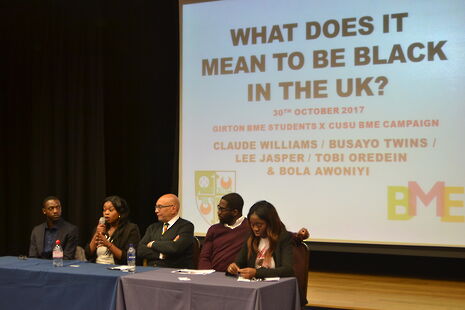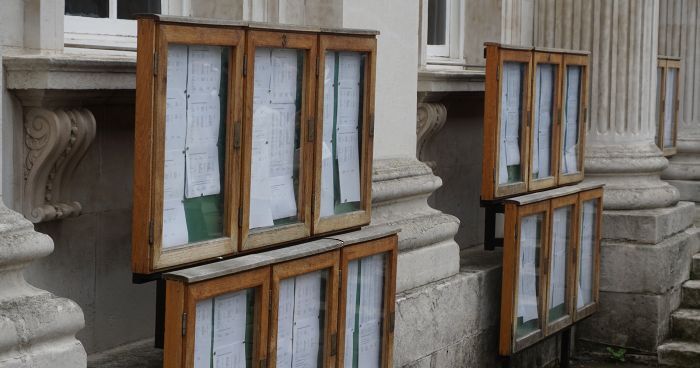Panel discussion explores issues of race in modern Britain
Panelists considered topics centered around the question, ‘What does it mean to be black in the UK?’

Members of the University met on Monday night to consider aspects of the black experience in modern Britain, from mental health to feminism.
Jointly organised by the CUSU BME campaign and Girton College JCR, the event brought together a panel of prominent speakers to share their views on the future of black communities in a post-Brexit Britain.
The event took place Monday night in the Yusuf Hamied Theatre at Christ’s College, and was attended by approximately 50 Cambridge students and faculty. Panellists included Tobi Oredin, co-founder of the lifestyle media website Black Ballad, political activist Lee Jasper, Claude Williams, founder of the personal development company Dream Nation, and Busayo Twins, a member of the Black Students Campaign Committee of the National Union of Students.
The panel discussion occurred amid ongoing debate over calls to decolonise the Cambridge English curriculum, which recently made national headlines. The Daily Telegraph issued an apology after their front-page article was widely criticised by Cambridge academics as “deliberately misleading and racially inflammatory”. The article led to CUSU women’s officer Lola Olufemi facing abuse from online trolls. The panellists briefly touched upon Olufemi, but the discussion concerned itself primarily with broader questions relating to race and gender beyond Cambridge.
The discussion began with the panel’s chair, CUSU BME campaign president Jason Okundaye, asking whether the speakers viewed nationalism in the UK as a fundamentally racist concept. Though the panellists were fairly unanimous in their agreement, each speaker approached the question of race in contemporary British politics differently. Oredin argued that recent political developments in the UK illuminated connections between racism and British nationalism, noting that in the run-up to the EU referendum, “certain political parties [allied with the Leave campaign] rallied on emotions of nationalism to push a racist agenda”.
Jasper approached the question from a more historical perspective, arguing that the recent “explosion of xenophobia and racism”, as well as the “emergence of neo-fascism”, had precedent in Europe. Jasper warned the audience that black people should not “get too comfortable”, and even suggested that they should “plan an escape route” in the event that minorities’ citizenships are contested.
A recurring theme throughout the discussion was the emphasis on history, both as a means for understanding contemporary issues of race, and as a way for black British people to learn about and appreciate their community’s past. Speakers tied this idea of a lost heritage and a legacy of racism to the current mental health crisis among black youth. There was a sense of frustration among all the panellists at a lack of support for black British people with mental health issues. Williams, the founder of the personal development company Dream Nation, lamented that the “the system doesn’t really care” about those suffering from mental health issues whom he knows.
Twins acknowledged the specific difficulties of addressing mental health issues at Cambridge, suggesting that “before people give you sympathy, they’re like, ‘but you’re at Cambridge’”, or that “you’re free from racism because you’re at Cambridge”.
Speaking to Varsity after the discussion, Okundaye emphasised the goal of the CUSU BME campaign as one of promoting a “long-term vision of Cambridge as inclusive”
 Comment / Plastic pubs: the problem with Cambridge alehouses 5 January 2026
Comment / Plastic pubs: the problem with Cambridge alehouses 5 January 2026 News / Cambridge businesses concerned infrastructure delays will hurt growth5 January 2026
News / Cambridge businesses concerned infrastructure delays will hurt growth5 January 2026 News / New movement ‘Cambridge is Chopped’ launched to fight against hate crime7 January 2026
News / New movement ‘Cambridge is Chopped’ launched to fight against hate crime7 January 2026 News / Uni-linked firms rank among Cambridgeshire’s largest7 January 2026
News / Uni-linked firms rank among Cambridgeshire’s largest7 January 2026 News / AstraZeneca sues for £32 million over faulty construction at Cambridge Campus31 December 2025
News / AstraZeneca sues for £32 million over faulty construction at Cambridge Campus31 December 2025










